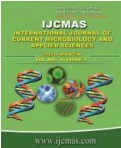


 National Academy of Agricultural Sciences (NAAS)
National Academy of Agricultural Sciences (NAAS)

|
PRINT ISSN : 2319-7692
Online ISSN : 2319-7706 Issues : 12 per year Publisher : Excellent Publishers Email : editorijcmas@gmail.com / submit@ijcmas.com Editor-in-chief: Dr.M.Prakash Index Copernicus ICV 2018: 95.39 NAAS RATING 2020: 5.38 |
The study was conducted in nine villages in Patsoi sub division of Imphal- West district of Manipur. A total of 120 respondents were selected from the nine villages through descriptive research design which form the sample size of the study. The data was elicited through personal interview method using structure interview schedule. Correlation analysis of technological gap of hybrid rice growers with independent variables was found that education, innovative proneness, economic motivation, mass-media exposure, contact with extension staff, source of information and knowledge about hybrid rice production technology were found to be negatively significant at 0.01 level of probability. After the analysis of the data the respondents were classified into three categories as low gap, medium gap and high gap category based, on their extent of technological gap on recommended hybrid rice cultivation practices. The overall technological gap with highest score was associated with medium category (56.67%) followed by low category (22.50%) and high category (20.83%). This indicates that majority of the farmers where in partial gap due to lack of complete knowledge and information about the recommended practices in hybrid rice production technology.
 |
 |
 |
 |
 |